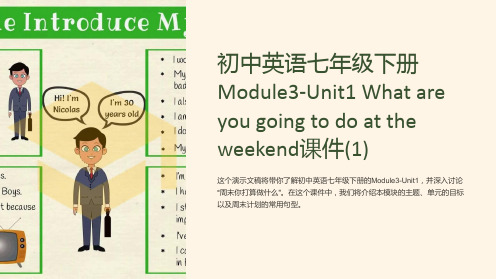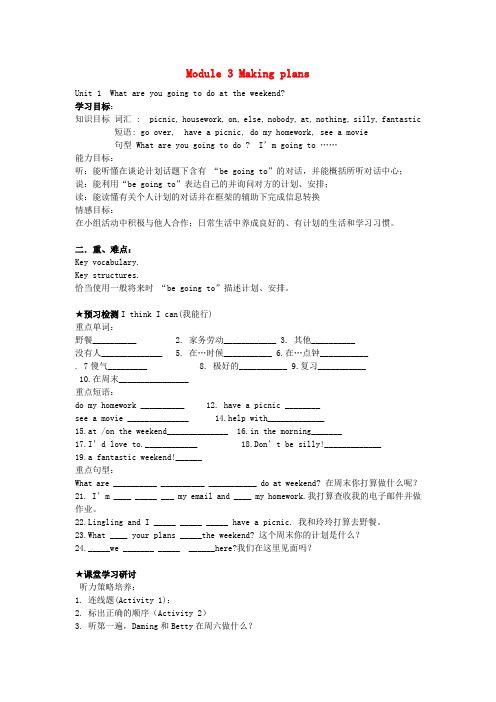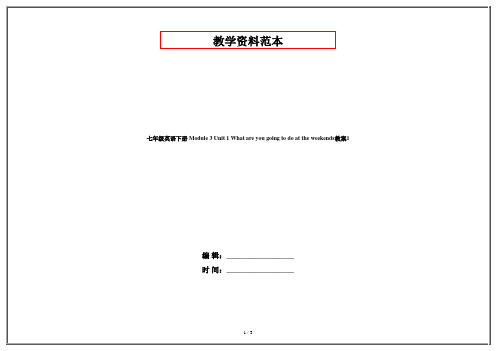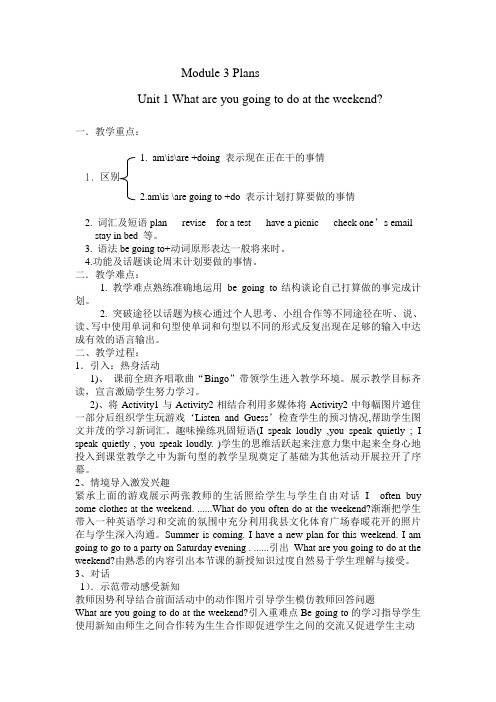2017年春七年级英语下册Module3Unit1Whatareyougoingtodoattheweekend教案
七年级英语下册Module3Unit1Whatareyougoingtodo

七年级英语下册Module3Unit1WhatareyougoingtodoModule 3 Making plansUnit 1 What are you going to do at the weekend?一、学习目标1.知识目标:掌握单词及短语:buy, party ,piano ,plan,revise,picnic,test ,get up early,have a picnic,revise for one's test,stay in bed,go to a party2.能力目标:能用be going to表达自己的计划.安排,并能询问对方的计划.安排。
3.情感目标:养成良好的有计划的生活和学习习惯,保持乐观的态度。
二.学习重点:be going to的意义和用法三.学习难点:be going to do sth.;would like的用法四.自主预习1.汉译英(1).做家庭作业 (2).早起床(3).查看电子邮件 (4).举行野餐(5).参加聚会 (6).为考试温习;复习(7).上一节钢琴课 (8).呆在床上2.独立完成Activity1 ,Activity2.3.朗读对话,找出疑难问题并做记录五.教学步骤1.导入T: What day is it today?S:Today is Friday/...T:What's the weather like?S:It's sunny/...T:What are you going to do at the weekend?S:I'm going to have a picnic/...利用句型,根据实际情况回答问题1.—What are you going to do this Sunday?—I'm going to...2.—What is your mother going to do at the weekend?—She is going to ...3.—what are your friends going to do at the weekend?—They are going to...2.听录音,掌握大意并回答下列问题:1.What's Daming going to do on Saturday morning?2.What's Betty going to do on Saturday afternoon?3.Who is going to have a piano lesson on Saturday?4. Where are they going to meet?3.大声朗读对话并注意对话中的重点短语。
2017外研版英语七年级下册module 3 unit 1what are you going to

Module 3 Unit 1 What are you going to do at the weekend教学目标To understand conversations about weekend plans ; To talk about weekend plans with the given information .教学重点---What are y ou going to do …… ? ---I’m going to …… .go over ; on ; at ; silly .教学难点be going to do学情分析本单元是学生初次接触一般将来时,应帮助学生理解“一般将来时”的含义,及熟练应用“be going to do”结构,特别应注意与以往学的一般现在时和现在进行时的区别。
学法指导帮助学生运用“be go ing to do”结构介绍自己的周末计划。
教学过程教学内容教师活动学生活动效果预测(可能出现的问题)补救措施修改意见一、Activi ty 1二、Activity 2三.一般将来时结构四、Activity 3五、听读对话1、给听力材料,检查学生听力答案。
2、给出动词短语图片3、老师方一段视频复习现在进行时,再引出一般将来时。
1、根据听力材料获得本科新的动词短语结构。
2、学生匹配短语和图片3、学生应用begoing to do练习对话(看图片)。
1、听一遍后有可能还有个别同学不能完全找到答案。
2、能完成,但是个别不熟悉。
3、一部分同学不能熟悉运用begoing to1、可以再听一遍。
2、读这些短语及汉语意思。
3、小组练习。
4、老师帮六、重要语法点七、Activity 4八、Activity 5九、Activit y6 (Homework)4、播放听力对话。
5、帮助学生分角色。
6、和同学一起找语法。
7、先讲解方框中的短语,并提醒学生注意形式。
8、播放听力。
9、再次领读一般将来时的对话,并把学生分成小组。
初中英语七年级下册Module3-Unit1 What are you going to do at

学习并掌握一些描述周末活动的词汇。
提高听说能力
通过与同学们的讨论,练习和提高英语口语表达能力。
周末计划句型
What are you going to do at the weekend?
你周末打算做什么?这是询问别人周末计划的 常用句型。
I am going to...
我打算...
活动一:根据图片回答问题
自我介绍
在开始之前,让我先来进行一下自我介绍。我是一名自信的学生,热爱学习和分享知识。我很高兴有机 会与大家一起探索这个有趣的主题。
本模块的主题
本模块的主题是“周末你打算做什么”。我们将学习如何用英语表达自己在周末 的计划,并探讨不同人的兴趣爱
学会使用常用的周末计划句型,如"What are you going to do at the weekend?"。
你打算和朋友们一起去公园野餐吗?
利用图片推测,回答关于周末计划的问题。
你是否计划在周末去山上徒步旅行?
通过观察图片,讨论并回答相关问题。
活动二:周末计划问卷调查
我们将进行一项有趣的问卷调查,了解同学们的周末计划。你将会收到一份问卷,并回答关于你自己的 周末活动的问题。我们将会汇总结果并进行讨论。
总结和复习
初中英语七年级下册 Module3-Unit1 What are you going to do at the weekend课件(1)
这个演示文稿将带你了解初中英语七年级下册的Module3-Unit1,并深入讨论 “周末你打算做什么”。在这个课件中,我们将介绍本模块的主题、单元的目标 以及周末计划的常用句型。
在本课件中,我们回顾了本模块的主题和本单元的目标。我们学习了常用的 周末计划句型,并进行了一些有趣的活动和讨论。祝贺大家完成了本次学习, 希望你们可以在周末活动中运用所学知识,展示自己的英语能力。
七年级英语下册 Module 3 Unit 1 What are you going to do

Module 3 Making plansUnit 1 What are you going to do at the weekend?学习目标:知识目标词汇 : picnic, housework, on, else, nobody, at, nothing, silly, fantastic 短语: go over, have a picnic, do my homework, see a movie句型 What are you going to do ? I’m going to ……能力目标:听:能听懂在谈论计划话题下含有“be going to”的对话,并能概括所听对话中心;说:能利用“be going to”表达自己的并询问对方的计划、安排;读:能读懂有关个人计划的对话并在框架的辅助下完成信息转换情感目标:在小组活动中积极与他人合作;日常生活中养成良好的、有计划的生活和学习习惯。
二.重、难点:Key vocabulary.Key structures.恰当使用一般将来时“be going to”描述计划、安排。
★预习检测I think I can(我能行)重点单词:野餐__________ 2. 家务劳动____________ 3. 其他__________没有人______________ 5. 在…时候___________ 6.在…点钟___________. 7傻气_________ 8. 极好的___________ 9.复习___________10.在周末________________重点短语:do my homework __________ 12. have a picnic ________see a movie ______________ 14.help with_____________15.at /on the weekend______________ 16.in the morning_______17.I’d love to.____________ 18.Don’t be silly!_____________19.a fantastic weekend!______重点句型:What are __________ __________ ___________ do at weekend? 在周末你打算做什么呢?21. I’m ____ _____ ___ my email and ____ my homework.我打算查收我的电子邮件并做作业。
外研版英语七年级下册Module 3 Unit 1《What are you going to do

外研版英语七年级下册Module 3 Unit 1《What are you going to do at the weekend》教学设计1一. 教材分析外研版英语七年级下册Module 3 Unit 1的主题是关于周末计划的询问和回答。
本节课的主要内容是让学生学会使用“What are you going to do at the weekend?”来询问他人的周末计划,并能用“I’m going to…”的句型回答。
教材通过不同的情境,让学生在实际语境中学习并掌握这一句型。
二. 学情分析七年级的学生已经掌握了基本的英语语法和词汇,对日常交流的语言功能有一定的了解。
他们在学习过程中需要将已学的知识运用到实际情境中,通过实践活动来提高语言运用能力。
同时,学生对新鲜事物充满好奇,善于模仿和探究,通过互动和合作可以更好地掌握语言知识。
三. 教学目标1.知识目标:学生能够听懂、会说、会读“What are you going to do atthe weekend?”和“I’m going to…”句型,并能用这两个句型进行简单的交流。
2.能力目标:学生能够在真实情境中运用所学知识进行交流,提高他们的语言运用能力。
3.情感目标:培养学生对周末活动的兴趣,激发他们学习英语的积极性。
四. 教学重难点1.重点:学生能够掌握并运用“What are you going to do at theweekend?”和“I’m going to…”句型进行交流。
2.难点:学生能够在实际情境中正确运用这两个句型,并能够根据实际情况进行适当的创造性的表达。
五. 教学方法采用任务型教学法,通过不同的任务让学生在实际语境中学习并运用所学知识。
同时,运用分组合作学习法,让学生在小组活动中互相交流、互相学习,提高他们的语言运用能力。
六. 教学准备1.教师准备:准备好相关的教学材料,如PPT、图片、卡片等。
2.学生准备:学生需要预习相关的词汇和语法知识。
外研版英语7年级下册:Module 3 Unit 1 What are you going to d

《Module 3 Making plans Unit 1 What are you going to do at theweekend ?》教学设计一、课题:《Module 3 Making plans Unit 1 What are you going to do at the weekend ?》是外研版《新标准》七年级英语下册第三模块第一单元的内容。
二、教材分析:本模块以“制定计划”为中心话题,此话题的选择十分符合教学和学习的实际。
通过一个学期的初中学习,本模块的学习能帮助学生逐步养成良好的有计划的学习和生活习惯。
对于那些已经有了良好的计划意识的学生来说,通过本模块的学习能够更加坚定他们的信心,在总结分享自己的经验过程中能更好的计划自己的学习、生活乃至人生。
第一单元是一节听说课型的新授课,主要以对话的形式呈现,学生在掌握一些关于周末活动的动词词组的前提下,与同学们谈论周末的计划、安排,学习用“be going to”句型表达自己打算或计划要做的事情,表达对周末生活的期待。
本单元因为是本模块的第一单元,学生在学习过程中进行充足的输入准备,不必对“be going to”句型所有人称的使用都能熟练掌握。
三、学情分析:七年级的学生经过小学和上一学期的英语学习,已经具备了英语的基本语言能力,能够说出一些有关于周末计划的动词短语,但是学生的周末生活并不是那么丰富,教师为学生提供了一些相关课外活动的图片来扩充一些相关词汇,教师也可以引导学生谈论一个“有趣”或“有意义”的周末计划,避免学生一张口只会说一些“doing homework”或“watching TV”的现象,同时可以对学生进行做有意义的事的德育渗透,并且对于那些学习和生活中缺乏计划的学生来说,这个话题可以帮助他们逐步建立起良好的、有计划的生活和学习习惯。
四、教学目标:1. 语言知识目标(1)话题:计划与安排(2)功能:能谈论和制订周末的计划、安排(3)语法:能理解“be going to”的意义并尝试使用(4)词汇:能理解并掌握下列词汇、短语、句型名词:plan, picnic, housework ;形容词:silly, fantastic;代词:nothing, nobody;副词:else, forward;介词:on, at;短语:go over, have a picnic, at the weekend句型:What are you going to do? I’m going to …. Are you going to …? Yes, we are.No, we aren’t.(5)语音:掌握元音字母“i”在重读开音节中读[ai]、在重读闭音节中读[I]以及读[i:]与半元音字母“y”在在重读音节中读[ai]、在非重读音节中读[I]2. 语言技能目标(1)听:能听懂本课有关周末的计划、安排的对话,并能判断出对话中人物的计划(2)说:能用“be going to”谈论自己的周末计划,并询问他人的计划(3)读:能模仿点读笔声音洪亮、语音语调准确、流畅地朗读本课对话3. 学习策略目标能根据自己的具体情况制定自己的学习和生活计划,并能与同学分享自己的计划4. 情感与态度目标形成自主学习的能力,养成有目的、有计划地做事的好习惯。
外研版英语七年级下册Module 3 Unit 1《What are you going to do

外研版英语七年级下册Module 3 Unit 1《What are you going to do at the weekends》教学设计一. 教材分析外研版英语七年级下册Module 3 Unit 1的主题是关于周末计划的询问和回答。
本节课的主要内容是让学生能够熟练运用一般将来时态,用“What are you going to do at the weekends?”和“I’m going to…”的结构进行对话,询问并回答他人的周末计划。
教材通过丰富的情境和真实的对话,帮助学生理解和运用目标语言,提高他们的语言交际能力。
二. 学情分析七年级的学生已经掌握了基本的日常英语对话,对一般将来时态也有了一定的了解。
但他们在实际运用中,可能会对一些复杂的情境和表达方式感到困难。
因此,在教学过程中,教师需要关注学生的个体差异,因材施教,引导他们积极参与课堂活动,提高他们的语言运用能力。
三. 教学目标1.知识目标:学生能够掌握一般将来时态的构成和用法,理解并能熟练运用“What are you going to do at the weekends?”和“I’m going to…”的结构进行对话。
2.能力目标:学生能够在真实情境中,运用目标语言进行交流,提高他们的语言交际能力。
3.情感目标:培养学生热爱生活,珍惜时间,合理安排周末时间的良好习惯。
四. 教学重难点1.重点:学生能够熟练运用一般将来时态,用“What are you going todo at the weekends?”和“I’m going to…”的结构进行对话。
2.难点:学生能够在真实情境中,灵活运用目标语言,进行交流。
五. 教学方法1.情境教学法:通过设置真实的周末生活情境,让学生在情境中感知和运用目标语言。
2.交际法:鼓励学生积极参与课堂对话,提高他们的语言交际能力。
3.任务型教学法:通过完成小组任务,让学生在实践中运用目标语言。
2017外研版英语七年级下册Module3Unit1Whatareyougoingtodoatthe

Module 3 Unit 1 What are you going to do at the weekend教学目标1.To master the new vocabulary of this unit.2.To understand the conversation by listening and reading.3.To master the use of“be going to+V”,and can make plans with the given information教学重点New words and expressions;The u se of“be going to+V”教学难点Talking plans and making plans.学情分析Students will learn how to to make plans by using“be going to”,so they should practice m with the given information with parters. Students’learning foundation is unbalanced,the need to be taught with different ways.学法指导Bottom-up approach教学过程教学内容教师活动学生活动效果预测(可能出现的问题)补救措施一、Warming-up:W hat is your plan work in groups and someone don’t examplespictures with thefrom Box A with theActivity 1 with thepictures.underline the points check with a parter.t he questions and findthe answers, then c hecksome mistakes.of them makestudents can notan swers witwhole clas s;ask them selves.the job ,and then checkthe homework.the structure.——I’m going to...at th e weekend.。
七年级英语下册 Module 3 Unit 1 What are you going to do at the weekends教案2

Module 3 Making plansUnit 1 What are you going to do at the weekend?课题: Module 3 Making plansUnit 1 What are you going to do at the weekend?(第二课时)【教学目标】知识目标:1.学习掌握新单词和短语2.学习,理解和掌握be going to do的用法能力目标:能听懂并掌握有关计划话题的讨论情感目标:通过这一单元有关计划得讨论和学习让学生学会合理的安排自己的日常生活,并能有计划的学习,养成良好的学习和生活习惯。
【教学重点】1.理解和掌握本模块的单词和短语的含义和用法。
2.理解和掌握本单元的核心语法点——be going to do【教学难点】能准确熟练的运用一般将来时来表达将来的计划和打算,并能熟的运用这一结构的肯定,否定,一般将来时和特殊疑问句的形式。
【教学方法】任务型教学法,讲授法,反复操练。
【重难点突破】:利用多媒体图片引导学生学习代词并反复练习。
【教具】A tape recorder, multimedia(六) 知识点归纳梳理(个人/小组)1.in/on介词on和in用于时间名词前的情况:on用于具体的某一天、星期几前,in用于上午、下午、晚上、月份和年份前。
eg:-When is the best time to make the cake?-It’s on Friday.I often do my homework in the morning/afternoon/evening.in July/in spring/summer/autumn/winter/in 20xx注意:特定某一天的上午、下午、晚上前应用介词on,而不是in.on the mor ning of July 1选择12. When are you going to leave _____ Beijing?时间名词前介词in和on用法口诀:年月周前要用in,具体日子却要禁。
七年级英语下册 Module 3 Unit 1 What are you going to do at the weekends教案1

Module 3 Making plansUnit 1What are you going to do at the weekend?课题: Module 3 Making plansUnit 1What are you going to do at the weekend?.(第一课时)【教学目标】知识目标:1.学习掌握新单词和短语2.学习,理解和掌握be going to do的用法能力目标:能听懂并掌握有关计划话题的讨论情感目标:通过这一单元有关计划得讨论和学习让学生学会合理的安排自己的日常生活,并能有计划的学习,养成良好的学习和生活习惯。
【教学重点】1.理解和掌握本模块的单词和短语的含义和用法。
2.理解和掌握本单元的核心语法点——be going to do【教学难点】能准确熟练的运用一般将来时来表达将来的计划和打算,并能熟的运用这一结构的肯定,否定,一般将来时和特殊疑问句的形式。
【教学方法】任务型教学法,讲授法,反复操练。
【重难点突破】:利用多媒体图片引导学生学习代词并反复练习。
【教具】A tape recorder, multime dia一、自主学习(一):学单词,跟录音或老师读单词,并掌握其拼写。
野餐__________家务劳动______________其他;另外_________没有人_____在……(某一天)_______在……(点钟) _______没有东西_______ 愚蠢的_________极好的__________(二)、重点短语:1).复习 _____________2).在周末 _________________3.)检查邮件 ______________4).在周六早晨 ___________ 5).看电影 ___________ 6).帮着做家务 __________(三)重点句型:1)W hat are you goingto do at the weekend,Daming?2)I’m going to help with the housework.3)Who else is going to be there?4)Are we going to meet here?5)Would you like to join us?6)Don’t be silly!四)1.听读课文并回答问题,见(P2)2.小组合作翻译课文五).句型语法讲解1.be going to +do(动词原形) 表示一般将来时意思是:打算做某事 ,计划做某事……Eg: On Saturday morning ,I am going to check my email.2.其中be动词的单复数要和主语的单复数形式一致。
外研版英语七年级下册:Module 3 Unit 1 What are you going to d

Module 3 PlansUnit 1 What are you going to do at the weekend?一.教学重点:1.am\is\are +doing 表示现在正在干的事情1. 区别2.am\is \are going to +do 表示计划打算要做的事情2. 词汇及短语plan revise for a test have a picnic check one’s emailstay in bed 等。
3. 语法be going to+动词原形表达一般将来时。
4.功能及话题谈论周末计划要做的事情。
二.教学难点:1. 教学难点熟练准确地运用be going to结构谈论自己打算做的事完成计划。
2. 突破途径以话题为核心通过个人思考、小组合作等不同途径在听、说、读、写中使用单词和句型使单词和句型以不同的形式反复出现在足够的输入中达成有效的语言输出。
二、教学过程:1.引入:热身活动1)、课前全班齐唱歌曲“Bingo”带领学生进入教学环境。
展示教学目标齐读,宣言激励学生努力学习。
2)、将Activity1与Activity2相结合利用多媒体将Activity2中每幅图片遮住一部分后组织学生玩游戏‘Listen and Guess’检查学生的预习情况,帮助学生图文并茂的学习新词汇。
趣味操练巩固短语(I speak loudly ,you speak quietly ; I speak quietly , you speak loudly. )学生的思维活跃起来注意力集中起来全身心地投入到课堂教学之中为新句型的教学呈现奠定了基础为其他活动开展拉开了序幕。
2、情境导入激发兴趣紧承上面的游戏展示两张教师的生活照给学生与学生自由对话I often buy some clothes at the weekend. ......What do you often do at the weekend?渐渐把学生带入一种英语学习和交流的氛围中充分利用我县文化体育广场春暖花开的照片在与学生深入沟通。
七年级英语下册 Module 3 Unit 1 What are you going to do a

Unit 1 What are you going to do at the weekend课 型:Listensing and speaking方 法:Bottom-up approach目 标:To understand c onversation a bout weekend plans To process information of weekend plans in the listeni ng meterialTo talk about weekend plans with given information重难点:1. be going to 结构 2. 动词happen \get ready for\等的用法Listen and match the words in Box 1 with words in Box 2.(P14,1) Write the phrases in Activity 1 und er the pictures.(P14,2)Listen and readListen and choose the best answers to the questions.How many people are there in the dialogue? A . two B . three C . four(2)What are they talking about?A. plans B . sports meeting C. festival(3)When is Betty going to buy any clothes?A.on SundayB.on Saturday afternoonC.on Saturday morning(4)What is Betty doing on Sunday ’s morning?A.go to a partyB.listen to musicC.stay in bedDaming Betty Saturday morning be going to emailafternoonbuy evening at a friend’s homeSunday morning earlyafternoonin the parkhave (1) 在周末_________(2)检查邮件________(3)上钢琴课________(4)听音乐_________(5)好主意________(6)待在床上_______(7)为考试而复习_______(8)吃野餐_________(9)去参加聚会________(10)打乒乓球________Listen and fnd out the difficult points__________________________________________________________________Fill in the blanks1.Why not (检查) your emails now?2.We are going to (买) some clothes on Sunday afternoon.3.In the afternoon,my sister (have) a piano lesson.4.Would you like (have) a pinic with me?5.We are going to buy some (clothe) on Saturday afternoon.6.Mike plans (go) to America.7.周末你打算做什么?8.我打算下午和朋友一起去野餐。
- 1、下载文档前请自行甄别文档内容的完整性,平台不提供额外的编辑、内容补充、找答案等附加服务。
- 2、"仅部分预览"的文档,不可在线预览部分如存在完整性等问题,可反馈申请退款(可完整预览的文档不适用该条件!)。
- 3、如文档侵犯您的权益,请联系客服反馈,我们会尽快为您处理(人工客服工作时间:9:00-18:30)。
Module 3 Making plans一、学习目标:A.单词和短语:go over, picnic, housework, on, else, nobody, at, nothing, silly, fantastic, forward, look forward to, fan, make friends, shirt, cheer, player, hope, win, enjoy oneself, during, May, May Day, late, something, walk, take a walk, country, second, collect, litter, fun, summer holiday, camp, Australian, sightseeing, go sightseeing, beach, early.B.交际用语:1. Sure!2. Would you like to join us?3. Don’t be silly!4. — What are you going to do on Saturday morning? — I’m going to ….5. What are you looking forward to this weekend?6. What are you going to do?7. Why are you going to do it?8. I’m going to check my email.9. Lingling and I are going to have a picnic.10. Lingling is going to have a piano lesson.11. — Are we going to meet here? — No, we aren’t.C. 教学目标1. Function : Talking about plans; making plans2. Structure: Be going to + verb; wh-questions and answers3. Skills: 1) Listening and understanding familiar topics (plans).2) Talking about familiar topics (plans).3) Reading and understanding simple passages.4) Composing a simple passage.4. Around the world: Weekend plans.5. Task: Talking about your weekend plans.二、重点及难点:be going to + verb; wh-questions and answers三、教学设计:Unit 1 What are you going to do at the weekend?ⅠTeaching modelListening and speakingⅡTeaching methodBottom-up approach to listeningⅢTeaching aims1. To understand conversations.2. Ask and answer: What are you going to do at the weekend?ⅣTeaching Objectives1. Key vocabulary: go over, picnic, housework, on, else, nobody, at, nothing, silly,fantastic2. Key structures: — What are you going to do on Saturday morning?— I’m going to ….ⅤTeaching aidsTape recorder, OHP, videoⅥTeaching StepsStep 1 Warming-up1. Show some pictures of school things. Say what they are.2. Read the words after the teacher.3. Introduce the new words.Step 2 Match.1. Ask the students to read the word and expressions in Activity 1.AB2. Play the recording and ask the students to listen to the recording carefully.3. Match the words and expression from Box A with the word and expressions from Box B.4. Play the recording again, then they can check their answer with a partner.5. Call back the answer from the whole class and check the answer.Keys:1. check my email2. go over lessons3. have a piano lesson4. see a movie5. help with the housework6. have a picnic6. Match the e xpressions in Activity 1 with the pictures in Activity 2.7. Read the expressions together.Step 3 Listen and read.1. Ask the students to read the conversation silently.2. Play the recording and ask the students to listen and read the conversation.3. Read the conversation.4. Act it out.5. Learn “Everyday English”Welcome back!Please be careful with…from now on.Step 4 Answer the questions.1. Read the conversation again.2. Answer the questions.1) What’s Daming going to do on Saturday morning?2) What’s Betty going to do on Saturday afternoon?3) Who is going to have a piano lesson on Saturday?4) Where are they going to have a picnic?3. Ask the students to check with a partner.4. Play the recording again .Check the answers:Keys:1. He is going to check his email, do his homewo rk and help with the housewo rk on Saturday morning.2. She is going to see a movie on Saturday afternoon.3. Lingling is going to have a piano lesson on Saturday.4. They are going to have a picnic in the park.Step 5 Complete the conversation.1. Ask the students to read the words in the box in Activity 4.2. Read through the conversation.Betty: What are your plans for next weekend, Lingling?Lingling: (1)____________. I don’t have any plans.Betty: Are you going to spend it (2)____________ at home?Lingling: Well, …what are you going to do?Betty: Tony and I are going to have a picnic in the park. We’re going to have a (3)____________ time. Are you going to come?Lingling: I’m not sure.Betty: Don’t be (4)____________! What (5)____________ are you going to do?3. Complete the conversation with the correct form of the words from the box.4. Ask the students to check with a partner.5. Check the answers:Keys: 1. Nothing 2. alone 3. fantastic 4. silly 5. else6. Read the conversation loudly.Step 6 Listen and repeat.1. Play the recording once without stopping.2. Play the recording again and stop at the end of each line. Ask the whole class to repeat.3. Play the recording again and stop at the end of each line. Ask individual students torepeat.4. Ask the students to practice the sounds in pairs.Step 7 Work in pairs.Ask and answer questions about your plants at the weekend.1. Ask and answer like this:— What are you going to do on Saturday morning?— I’m going to check my email and do my homework.2. Read through the example with the class.3. Pair them to ask and answer.4. Circulate and monitor their production.5. Complete the diary.Step 8 Guessing game.1. Show some pictures of school things.2. According to the information given and ask the students to guess what it is.3. Show the pictures to check the answers.Step 9 Do exercises:一、翻译下列短语:1. 查电子邮件 ______________2. 复习功课 ________________3. 上钢琴课 ________________4. 看电影 _________________5. 帮助做家务 _______________6. 野炊 ____________________Keys:1. check my email2. go over lessons3. have a piano lesson4. see a movie5. help with the housework6. have a picnic二、完成句子:1. 我打算在早上查看一下电子邮件。
